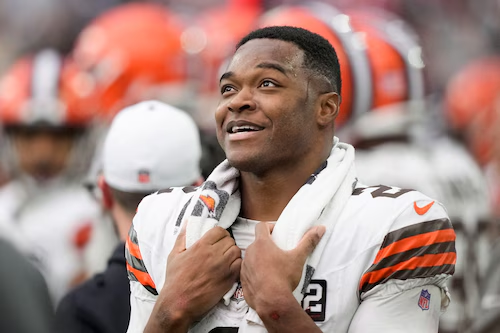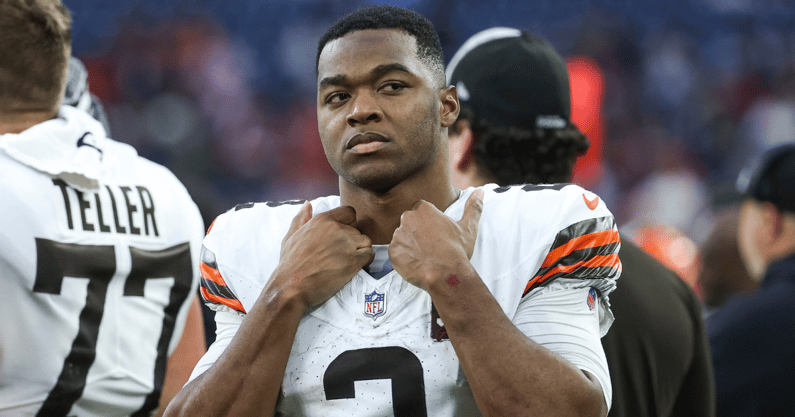Two years ago, the Browns obtained Amari Cooper from the Cowboys in a trade involving a fifth-round pick and a swap of sixth-round picks. This move occurred when the Cowboys sought to relieve themselves of Cooper’s $20 million per year contract to manage their salary cap. Cooper has performed exceptionally well during his time in Cleveland, but he’s currently holding out from training camp in hopes of renegotiating his contract.
Since Cooper was traded to the Browns, the wide receiver landscape has changed significantly, and the Cowboys were at a crucial point where they were willing to release him if they couldn’t find a suitable trade partner. Additionally, there have been notable increases in the salary cap.
Cooper’s absence from mandatory minicamp indicates his desire for a new contract before the upcoming season. He’s in the final year of his current deal with a $20 million base salary. Deshaun Watson, during a press conference, praised Cooper’s abilities and expressed support for his decision to hold out.
The Browns, including head coach Kevin Stefanski, are aware of Cooper’s holdout and are engaged in discussions with him. Both sides are working to reach a mutually beneficial agreement, considering the situation from various perspectives.
The Cleveland Browns and Andrew Berry recognize the necessity of retaining Amari Cooper. With consecutive seasons surpassing 1,000 yards, he has been the linchpin of Cleveland’s passing game, showcasing versatility by thriving under the throws of five different quarterbacks. Since the Browns’ resurgence in 1999, he stands as the most prolific receiver after Josh Gordon, whose single-game yardage record Cooper eclipsed last season in Houston.
Coming off his most impressive statistical performance yet, Cooper amassed 72 receptions for 1,250 yards and five touchdowns. While the Browns are eager to retain him as their primary wide receiver, his age and tenure in the league raise questions about the extent of their commitment.

Approaching his 30th birthday, the Browns are likely hesitant to tie significant funds beyond the 2025 season. The focus shifts from the initial extension offer to the structure of guaranteed money and the duration of commitment. While both parties acknowledge that $20 million falls short of his value, the negotiation hinges on the extent of guaranteed funds and contract duration.
In the NFL, preemptive decisions often outweigh delayed ones, yet Cooper still possesses considerable playing years. Ideally, the Browns seek an extension covering this season, securing guaranteed funds until 2025 with a potential exit clause thereafter. They might be inclined to offer more upfront to facilitate a contract favoring the team’s interests in the long term, avoiding commitments into Cooper’s mid-thirties.
Despite Cooper’s leverage, his demands must align with reason. Should he seek an exorbitant figure exceeding $30 million, the Browns retain the option to negotiate firmly. Cooper would then play out his final contract year, earning the scheduled $20 million and likely exploring free agency afterward.
Both parties have incentives to strike a fair deal. Cooper’s intangibles, including his character and leadership, hold weight in the Browns’ evaluation, contrasting with potential suitors. Additionally, the Browns must consider the optics of Cooper’s contract negotiations, aiming to maintain a reputation for fair compensation—a gesture that resonates with current players, agents, and future free agents, given the team’s burgeoning talent pool.
When looking at the current market, there are a few deals to note that could be relevant in gauging what a potential deal could look like. Cooper is currently 20th among the highest-paid wide receivers in the league. The first major qualifier here is his age. At 30 years old, he isn’t likely to ask for top-of-the-market money. Two examples stand out.
Mike Evans
Mike Evans is almost 31 years old and caught 79 passes for 1255 yards and 13 touchdowns last season. He just signed a two-year, $41,000,000 extension with the Tampa Bay Buccaneers, including $35 million guaranteed and an average annual salary of $20.5 million.

Calvin Ridley
Calvin Ridley, 29 and half years old, caught 76 balls for 1176 yards and eight touchdowns last season and signed a 4-year deal worth $92 million with the Tennessee Titans. The deal guarantees him $50 million and an average annual salary of $23 million.
One point that should be noted about both deals is that they have potential outs for the team built in after the 2025 season.
The Browns should attempt to work in the same kind of out after 2025, which would mean adding some money to his base this year and converting it to guaranteed money along with another year of fully guaranteed money.
WR AMARI COOPER AND HIS AGENT DAVID MULUGHETA
Cooper and his agent, David Mulugheta, are aware of their bargaining power in the situation. As the Browns’ top receiver, Cooper’s position is secure for the upcoming season, despite the addition of Jerry Jeudy and the drafting of Jamari Thrash. Understanding the significance of this year for the team, Cooper recognizes his indispensability.
His current contract, worth $20 million, lacks guarantees, prompting Mulugheta to advise against risking injury during practice without assured compensation. Aware of the booming wide receiver market, Cooper sees an opportunity to negotiate for both financial security and a higher salary. While the specifics of his demands remain undisclosed, given the market trends for players of his caliber and age, it’s reasonable to speculate that he’s aiming for a contract in the range of the mid-to-low twenties.

Cooper and his agent are aiming for the assurance of guaranteed money beyond the current year. The duration of the proposed contract presents a potential challenge. On one hand, Cooper might opt for a shorter deal, allowing him to renegotiate in his early thirties if he maintains his performance level. Conversely, he could seek a longer contract, possibly his final substantial deal in the NFL.
Typically, players tend to secure more favorable terms from teams where they’ve already demonstrated their value. Therefore, reaching an agreement before the season begins seems logical for Cooper and his agent.
While they seek to maximize leverage, an overly ambitious demand could lead to Cooper playing out his existing contract, banking on another stellar season to secure a lucrative deal as a free agent. However, given his age, this strategy carries significant risk. It’s in Cooper’s interest to negotiate sincerely, finding a compromise that satisfies both parties.
Failing to reach a deal would be undesirable for both sides, but the stakes are higher for Cooper. Overplaying his hand could leave him in a challenging position, playing at age 30 under a non-guaranteed contract and needing to prove himself once more for a substantial payday.





Leave a Reply